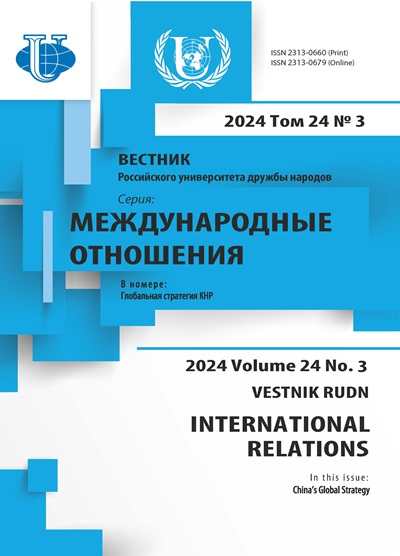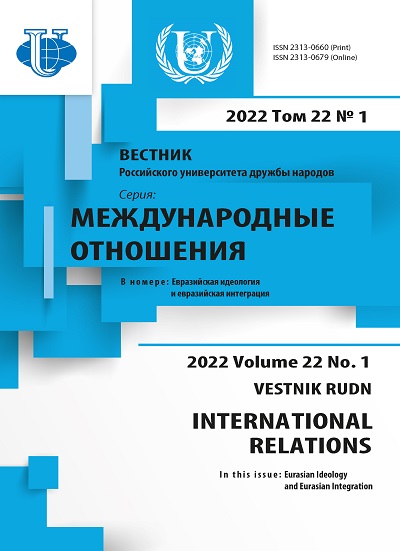The Ideological Foundations of Eurasian Economic Integration
- Authors: Pantin V.I.1
-
Affiliations:
- Primakov National Research Institute of World Economy and International Relations, Russian Academy of Sciences
- Issue: Vol 22, No 1 (2022): Eurasian Ideology and Eurasian Integration
- Pages: 17-29
- Section: THEMATIC DOSSIER
- URL: https://journals.rudn.ru/international-relations/article/view/30676
- DOI: https://doi.org/10.22363/2313-0660-2022-22-1-17-29
Cite item
Full Text
Abstract
The article analyzes the significance of Eurasian ideology for modern economic integration, the reasons for its limited use in the Eurasian Economic Union (EAEU), and the possibilities and prospects of adapting Eurasianism for the purposes of economic development and integration. Many international economic integration associations (e.g., the EU, USMCA, ASEAN) have a common or similar ideological and value-based foundation, which ensures stronger integration. The EAEU was initially established without a common, integrating ideological basis, although the first president of Kazakhstan, Nursultan Nazarbayev, suggested using Eurasianism as the ideology of integration. Sergey Glazyev also wrote about the importance of integrative ideology for the development of the EAEU. However, these attempts to introduce Eurasian ideology for a stronger integration were not supported by the rest of the EAEU countries. This was largely because most EAEU members, including Russia, were driven by short-term economic interests, forgetting about more important long-term, strategic goals. Moreover, there are important ideological divisions in society and in the political elites of Russia, Belarus, Kazakhstan, Armenia, and Kyrgyzstan - primarily the division between adherents of the ideology and practices of Western liberalism, oriented toward EU integration, and supporters of an ideology close to Eurasianism and defense of traditional values, oriented toward the development of integration in the Eurasian space. The reproduction of such divisions in the EAEU countries, as well as the absence or weak development of an integrative ideology, largely determines the inconsistent and not always effective integration in the EAEU. Eurasianism can become an integrative ideology, which, if developed and adapted to modern realities, can ensure a stronger economic integration. This requires overcoming illusions about the possibility of integration of Russia and other post-Soviet countries into the EU, pursuing an active information policy in the Eurasian countries, showing the commonality of geopolitical and economic interests of EAEU countries and the opposition of these interests to those of the USA. Eurasianism can effectively counter the threat of ethnic nationalism in the EAEU countries by emphasizing Eurasian integration as a necessary condition for preserving the sovereignty of Eurasian countries, their traditional values, and the combination of tradition and innovation.
About the authors
Vladimir I. Pantin
Primakov National Research Institute of World Economy and International Relations, Russian Academy of Sciences
Author for correspondence.
Email: v.pantin@mail.ru
ORCID iD: 0000-0002-4218-4579
PhD, Dr. of Sc. (Philosophy), Chief, Department of Comparative Political Studies
Moscow, Russian FederationReferences
- Akaev, A. A. (2012). Eurasian Union and Russia’s resurgence. Geopolitics and Security, (3), 15—21. (In Russian).
- Akaev, A., & Pantin, V. (2018). Central Asia as the economic and geopolitical tension nexus: Some implications for the world futures. World Futures, 74(1), 36—46. https://doi.org/10.1080/02604027.2017.1357963
- Andronova, I. V. (Ed.). (2020). Economic security of the EAEU. Moscow: RUDN publ. (In Russian).
- Bassin, M., & Pozo, G. (Eds.). (2017). The Politics of Eurasianism: Identity, Popular Culture and Russia’s Foreign Policy. London: Rowman & Littlefield.
- Bassin, M., Glebov, S., & Laruelle, M. (Eds.). (2015). Between Europe and Asia: The origins, theories and legacies of Russian eurasianism. Pittsburgh, PA: University of Pittsburgh Press. https://doi.org/10.2307/j.ctt15nmjch
- Bereznyakov, D. V., & Kozlov, S. V. (2017). Projecting the development strategy of the Eurasian Economic Union through the prism of the International Relations’ alliance theory. Tomsk State University Journal of History, (50), 58—63. (In Russian). https://doi.org/10.17223/19988613/50/8
- Bickerton, C. J. (2012). European integration: From nation-states to member states. Oxford: Oxford University Press. https://doi.org/10.1093/acprof:oso/9780199606252.001.0001
- Braudel, F. (1994). A history of civilizations. New York: Alien Lane — Penguin Press.
- Brubaker, R. (2011). Nationalizing states revisited: Projects and processes of nationalization in post-Soviet states. Ethnic and Racial Studies, 34(11), 1785—1814. http://dx.doi.org/10.1080/01419870.2011.579137
- Efimova, L. M., & Khokhlova, N. I. (2020). Conceptualization of “Asian values” in Malaysia and Singapore. Mirovaya Ekonomika i Mezhdunarodnye Otnosheniya, 64(1), 91—98. (In Russian). https://doi.org/10.20542/0131-2227-2020-64-1-91-98
- Gerber, D. (1994). Constitutionalizing the economy: German neo-liberalism, competition law and the “New” Europe. The American Journal of Comparative Law, 42(1), 25—84. https://doi.org/10.2307/840727
- Glaziev, S. Yu. (2018). Leap into the Future. Russia in the new technological and world-economic orders. Mosccow: Knizhnyi mir publ. (In Russian).
- Glaziev, S. Yu. (2021). Beyond the horizon of the end of history. Moscow: Prospekt publ. (In Russian).
- Gumilev, L. N. (2007). Rhythms of Eurasia: Epochs and civilizations. Moscow: AST publ. (In Russian).
- Habermas, J. (2009). Europe: The faltering project. Cambridge: Polity Press.
- Hosny, A. S. (2013). Theories of economic integration: A survey of the economic and political literature. International Journal of Economy, Management and Social Sciences, 2(5), 133—155.
- Huntington, S. P. (1996). The clash of civilizations and the remaking of world order. New York: Simon & Schuster.
- Kurylev, K. P., Malyshev, D. V., Khotivrishvili, A. A., & Shablovskii, V. S. (2021). SCO and EAEU in the context of Eurasian integration. Mirovaya Ekonomika i Mezhdunarodnye Otnosheniya, 65(2), 81—88. (In Russian). https://doi.org/10.20542/0131-2227-2021-65-2-81-88
- Lemay-Hebert, N. (2009). Statebuilding without Nation-Building? Legitimacy, state failure and the limits of the institutional approach. Journal of Intervention and Statebuilding, 3(1), 21—45. https://doi.org/10.1080/17502970802608159
- Libman, A., & Vinokurov, E. (2012). Holding-together regionalism: Twenty years of post-Soviet integration. London: Palgrave Macmillan. https://doi.org/10.1057/9781137271136
- Murray, D., & Brown, D. (Eds.). (2012). Multipolarity in the 21st century: A new world order. New York: Routledge.
- Nazarbayev, N. A. (1997). Eurasian Union: Ideas, practice, perspectives. Moscow: Fond sodeistviya razvitiyu sotsialnykh i politicheskikh nauk publ. (In Russian).
- Panarin, A. S. (1994). Russia in civilizational process (between Atlanticism and Eurasianism). Moscow: Institut filosofii RAN publ. (In Russian).
- Rosamond, B. (2000). Theories of European integration. Basingstoke, New York: Palgrave Macmillan.
- Savitsky, P. N. (1997). Continent of Eurasia. Moscow: Agraf publ. (In Russian).
- Semenenko, I. S., Lapkin, V. V., Bardin, A. L., & Pantin, V. I. (2017). Between the State and the Nation: Dilemmas of identity policy in post-Soviet societies. Polis. Political Studies, (5), 54—78. (In Russian). https://doi.org/10.17976/jpps/2017.05.05
- Tkachuk, S. P. (2016). EAEU and all others. Rossia v Global’noj Politike, 14(3), 94—110. (In Russian).
- Toynbee, A. J. (1948). Civilization on trial. New York: Oxford University Press.
- Vernadsky, G. V. (1997). Russian history. Moscow: Agraf publ. (In Russian).
- Wallerstein, I. (1990). Culture as the ideological battleground of the modern world-system. Theory, Culture & Society, 7(2—3), 31—55. https://doi.org/10.1177/026327690007002003
- Walt, S. M. (2009). Alliances in unipolar world. World Politics, 61(1), 86—120. https://doi.org/10.1017/S0043887109000045
- Yelikbaev, K. N., & Andronova, I. V. (2021). Five years of the EAEU services common market. Contemporary Europe, (2), 99—110. (In Russian). http://dx.doi.org/10.15211/soveurope2202199110
- Yun, S. M. (2017). Educational cooperation in the Eurasian Economic Union: Problems and prospects. Tomsk State University Journal of History, (50), 89—92. (In Russian). https://doi.org/10.17223/19988613/50/13
- Zeleneva, I. V., & Ageeva, V. D. (2018). Ideology of Eurasian integration. Post-Soviet Studies, 1(8), 736—745. (In Russian).











